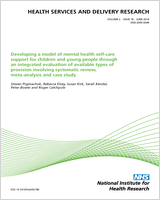Included under terms of UK Non-commercial Government License.
NCBI Bookshelf. A service of the National Library of Medicine, National Institutes of Health.
Senior J, Forsyth K, Walsh E, et al. Health and social care services for older male adults in prison: the identification of current service provision and piloting of an assessment and care planning model. Southampton (UK): NIHR Journals Library; 2013 Aug. (Health Services and Delivery Research, No. 1.5.)

Health and social care services for older male adults in prison: the identification of current service provision and piloting of an assessment and care planning model.
Show detailsBackground
Older prisoners are the fastest growing subgroup in the prison estate in England and Wales.1–4 In spite of the rapid increase in numbers and the complex and costly health and social care needs of older prisoners,5 their service provision is currently often suboptimal.6 Emerging evidence has suggested that there are particular service provision and integration deficits at key transition points for older prisoners, such as on entry to and discharge from prison.7
This programme of research examined the health and social care needs and current service provision for older male adults entering and leaving prison, and evaluated a model for systematic needs assessment and care planning for these groups. Women have been excluded from the study because of the low number of older female prisoners. In June 2011 there were only 63 female prisoners aged ≥ 60 years in England and Wales compared with 2952 male prisoners in this age group [National Offender Management Service (NOMS), 2011, personal communication].
Objectives
The specific objectives of the current study were:
- to explore the lived experiences and needs of older people entering and leaving prison
- to describe current provision of services, including integration between health care and social care services
- to pilot and evaluate an intervention for identifying health and social care needs on reception into prison and ensuring that these are systematically addressed during older people's time in custody.
Methods
The research programmes was a mixed-methods study divided into four parts:
- a study of all prisons in England and Wales housing adult men, establishing the current availability and degree of integration of health and social care services for older adults
- establishing the health and social care needs of older men entering prison, including their experiences of reception into custody
- the development, implementation and evaluation of an intervention to identify and manage the health care, social care and custodial needs of older men entering prison
- exploration of the health and social care needs of older men released from prison into the community.
Ethical considerations
Ethical approval to conduct the study was obtained from South Staffordshire Local Research Ethics Committee (09/H1203/47) and the University of Manchester's Research Ethics Committee. To access Her Majesty's Prison Service (HMPS) establishments, governance approval was obtained from the NOMS National Research Committee and from individual prison governors/directors. For each establishment, site-specific approval was obtained from the relevant NHS primary care and mental health trusts. Research staff had NHS research passports and letters of access.
To ensure informed consent, all participants were provided with a participant information sheet (see Appendix 11). The information detailed on the sheet was also verbally imparted to ensure comprehension and allow for any literacy difficulties. Participants were provided with the opportunity to ask questions and were given at least 24 hours to consider their participation. Participants were frequently reminded of their right to withdraw from the study at any time. All written consent was obtained by researchers rather than prison or health care staff.
All participants had issues of confidentiality explained to them and were aware that the informationthey provided would be treated in confidence unless we were concerned for their immediate safety, or the safety of others. In such circumstances the appropriate individuals at prison establishments were informed. In some instances this led to the opening of Assessment, Care in Custody and Teamwork (ACCT) documents to ensure that prisoners who were at risk of self-harm were appropriately supported by prison and health care staff.
The safety of researchers was also prioritised and appropriate strategies were in place for conducting interviews in prison and in the community. Interviews were conducted in public places when possible. When this was not plausible because of interviewees' mobility difficulties, two researchers were present.
The University of Manchester and NHS protocols for data protection were strictly adhered to.
The authors have no competing interests to report.
- Introduction - Health and social care services for older male adults in prison: ...Introduction - Health and social care services for older male adults in prison: the identification of current service provision and piloting of an assessment and care planning model
Your browsing activity is empty.
Activity recording is turned off.
See more...